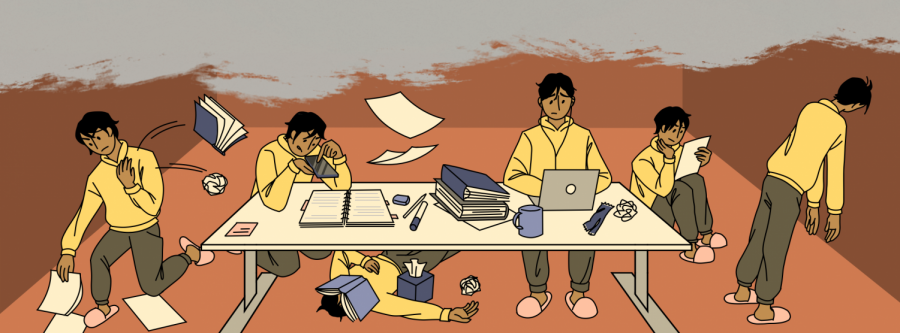Editorial: Finals format should be adjusted to reduce stress amidst online situation
With the start of another semester online, it’s likely that finals will again be virtual. Last semester, virtual finals varied drastically by class, spanning Schoology multiple-choice exams, Desmos free responses and Google Docs. For some classes, Dead Week — the week before finals usually allotted to studying—was blocked with last-minute new content. On top of that, many students lacked the support of steady WiFi, study groups and adequate studying resources.
In essence, holding finals online exacerbates many issues inherent to distance learning—a heavier reliance on self-studying, convoluted test formats, unstable internet connections—all of which contribute to additional stress during an already stressful time. As such, until school returns fully in-person, The Oracle urges Gunn educators to replace finals with asynchronous assessments or projects better suited to virtual platforms.
First, online learning places more stress on independent studying. Previously, much of finals preparation relied on collaboration and review. With online learning, study groups have all but flown out the window. It’s difficult for students to immerse themselves in studying while juggling household and technological distractions. We don’t have Flex time or live classes, and teachers often dedicate valuable Office Hours to retakes. We need more options, and teachers can do better than forcing students to take finals in an unpredictable format with only themselves to rely on.
Moreover, online learning has changed the final exams themselves. Some require students to draw or upload their work, some have free-response or multiple-choice sections and most are timed. These options add clutter for students to filter through when facing an already stressful final exam. For instance, the simple act of uploading images might involve using AirDrop, downloading from a Google Drive or rigging methods through website platforms. At each step, there are many ways the test experience can go wrong. Confusing finals formats introduce a plethora of stressful logistical obstacles, all while the timer counts down.
Along the vein of mid-test mess-ups, internet instability poses a significant threat to a successful submission. It’s proven to be an issue for many students throughout the year—school has been interrupted by sudden neighborhood internet blackouts, and it’s not uncommon for students to drop from classes without warning. With so many things that could go wrong during an intense exam, it’s evident that the typical timed finals format will not work synchronously online.
Instead, Gunn should establish cumulative final projects tailored to specific classes. Asynchronous evaluations give students more time to present their knowledge while allowing them to seek instructor guidance and avoid internet issues. Cumulative final projects or presentations place students in control of their final exam. Amidst a pandemic and reopening considerations, there are few decisions that universally benefit students, but in the view of The Oracle, altering the traditional final exam for this semester is undoubtedly one of them.
Correction: Dead Week is not an official part of the Gunn schedule; there are, however, two review days officially slotted in before finals when teachers are not supposed to introduce new content.
Your donation will support the student journalists of Henry M. Gunn High School. Your contribution will allow us to purchase equipment and cover our annual website hosting costs.
The Oracle is a newspaper publication produced by and for the students of Henry M. Gunn High School in Palo Alto, California. The newspaper publishes...

Chinyoung Shao is a photos editor and graphics artist who has been on staff since freshman year. Outside of The Oracle, she enjoys doodling, debate and...


